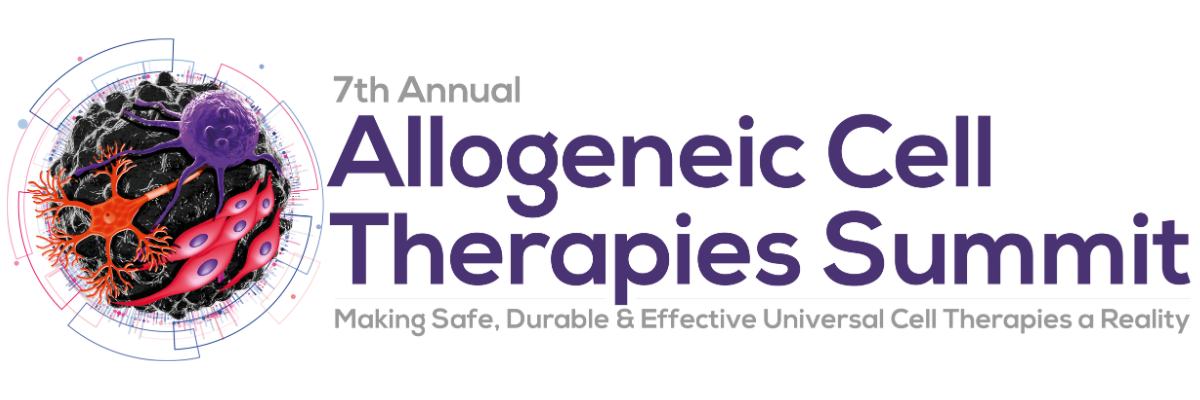LIVE NOW!
7:45 am Check-In & Coffee
8:25 am Chair’s Opening Remarks
Optimizing Patient Dosing & Treatment for Enhanced & Lasting Therapeutic Outcomes
8:30 am Panel Discussion: Ensuring Lasting Therapeutic Responses from Allogeneic Therapy – Is Redosing the Way to Go?
Synopsis
- Examine the role of redosing in sustaining therapeutic efficacy and preventing disease relapse in patients receiving allogeneic therapies
- How do we determine if multiple doses are needed and if so, how do we determine how many?
- Is it better to use a one and done model or plan for multiple doses?
- Analyze the impact of treatment schedules and regiments such as lymphodepletion on patient outcomes when scheduling multiple doses
9:00 am Maximizing Treatment Outcomes Through Strategic Patient Selection by HLA Matching
Synopsis
- Explore the criteria for identifying patients who are most likely to benefit from allogeneic therapies, focusing on genetic, clinical, and demographic factors
- How can we determine which patient is more likely to have increased allogeneic rejection?
9:30 am Morning Break & Speed Networking
Preclinical
Synopsis
Track Chair: Enrique Zudaire, Senior Vice President of Translational Sciences & Therapeutics Discovery, Caribou Biosciences
Achieving Reliable & Effective Genetic Engineering to Transform Allogeneic Cells
10:30 am Leveraging a TALEN Engineering Platform to Generate Potent & Safe Armored CAR-Ts
Synopsis
- Discussing the use of TALEN for advanced gene editing of T-cells
- Creating smart CAR-Ts that can respond to their environment and have efficient activity when encountering the tumor micro-environment
11:00 am Leveraging the Latest Allo-Evasion Technologies for Prolonged Therapeutic Effects
Synopsis
- Examine cutting-edge allo-evasion technologies designed to minimize immune rejection and prolong the efficacy of allogeneic therapies
- Discuss the mechanisms behind these technologies and their potential impact on patient outcomes and treatment longevity
11:30 am Panel Discussion: Understanding the Merits & Feasibilities of HLA Matching
Synopsis
- Explore the importance of HLA matching in improving patient outcomes and reducing the risk of allogeneic rejection in allogeneic therapies
- Evaluate the feasibility and logistical considerations of implementing HLA matching in clinical settings to optimize donor-recipient compatibility
- Discuss recent advancements and tools that facilitate HLA matching processes, enhancing the overall efficacy of allogeneic treatments
Manufacturing & Process Development
Laying the Foundations for a Seamless Transition into Large Scale Manufacturing
10:30 am Upscaling & Transferring Manufacturing of an Allogeneic Active Immune Therapy in Preparation for Commercialization
Synopsis
- Discussing key strategies to upscale manufacturing of an allogeneic dendritic cell cancer vaccine by partnering with CDMOs
- Vididencel is a maintenance immunotherapy designed to improve relapse-free and overall survival in AML
- Sharing strategies for a smooth tech transfer to take product manufacture to a larger level
11:00 am Expanding & Differentiating HSCs into NK Cells Using Stir Tanks for Large Scale Commercial Manufacturing
Synopsis
- Employing a unique molecule to effectively expand HSCs into NKs and various desired cell types
- Discussing the process of manufacturing in large quantities using bioreactors
11:30 am Panel Discussion: Key Considerations for Commercial Scale Manufacturing
Synopsis
- Dive into key factors required to realize commercial scale manufacturing
- Understanding when the right time for process lock is
- Discuss whether to involve CDMOs, when to do so, and how to assess readiness for external manufacturing
12:15 pm Lunch Break & Networking
Leveraging Cell Engineering to Maximize Anti-Tumor Properties of Allogeneic Cells
1:15 pm Harnessing Allogeneic NK Cells: Non-Engineered, Engineered, & Combination Approaches in Oncology & Autoimmune Disorders
Synopsis
- Clinical development of non-engineered NK cells in hematological malignancies
- Preclinical innovations in engineered and combination NK cell therapies for oncology and autoimmunity
1:45 pm Engineering Next-Generation CAR cell Therapies to Navigate Challenges in Liquid & Solid Tumors
Synopsis
- SENTI-202 is a CAR-NK cell therapy that uses logic gated gene circuits to address these challenges and has shown positive preliminary clinical data in AML
- Solid tumors pose additional challenges. Senti has leveraged high throughput screening and machine learning to engineer next generation gene circuits, which work in both T and NK cells, designed for improved performance against solid tumors
Addressing Critical Bottlenecks to Manufacturing Larger Cell Batches to Unlock Mass Production
1:15 pm Approaches for Scalable Manufacturing of Engineered B-Cell Medicines: A New Class of Cellular Medicines
Synopsis
- Be Biopharma has developed a new class of cellular medicines – Engineered B-Cell Medicines (BCMs) – with the potential to be durable, allogeneic, redosable and administered without pre-conditioning
- B-Cell Medicines (BCMs) are produced with ex vivo precision engineering of B-cells using CRISPR/Cas9 and homology directed repair-mediated transgene insertion followed by ex vivo differentiation towards plasma cell lineage
- Process development, optimization and scalable manufacturing strategies will be discussed
1:45 pm Maximizing Cell Viability by Preventing Exhaustion During Cell Expansion
Synopsis
- Explore innovative techniques to monitor cellular health and functionality throughout the expansion process
- Discover the impact of culture media and environmental factors on preventing cell fatigue and maintaining robust performance
2:15 pm Afternoon Break & Networking
Building Allogeneic Therapies for Commercial Success Through Purposeful Product Development & Regulatory Expertise
3:00 pm Case Study: Comparing & Contrasting Product Development of Allogeneic Therapies Versus Autologous from Preclinical All the Way to Clinical
Synopsis
- Sharing lessons learned from commercializing autologous CAR-T products and the application of these to allogeneic development
- Discussing new challenges and considerations that arise with allogeneic products
3:30 pm Panel Discussion: Navigating the Regulatory Landscape in Allogeneic Product Development to Gain Clarity & Advance the Future of Universal Cell Therapies
Synopsis
- Exploring the historical perspective that “your process is your product” and the implications of frequent process changes on regulatory submissions
- Examining key differences in regulatory expectations for allogeneic versus autologous therapies
- Discussing strategies for maintaining open communication with regulators to foster understanding and facilitate smoother approvals
